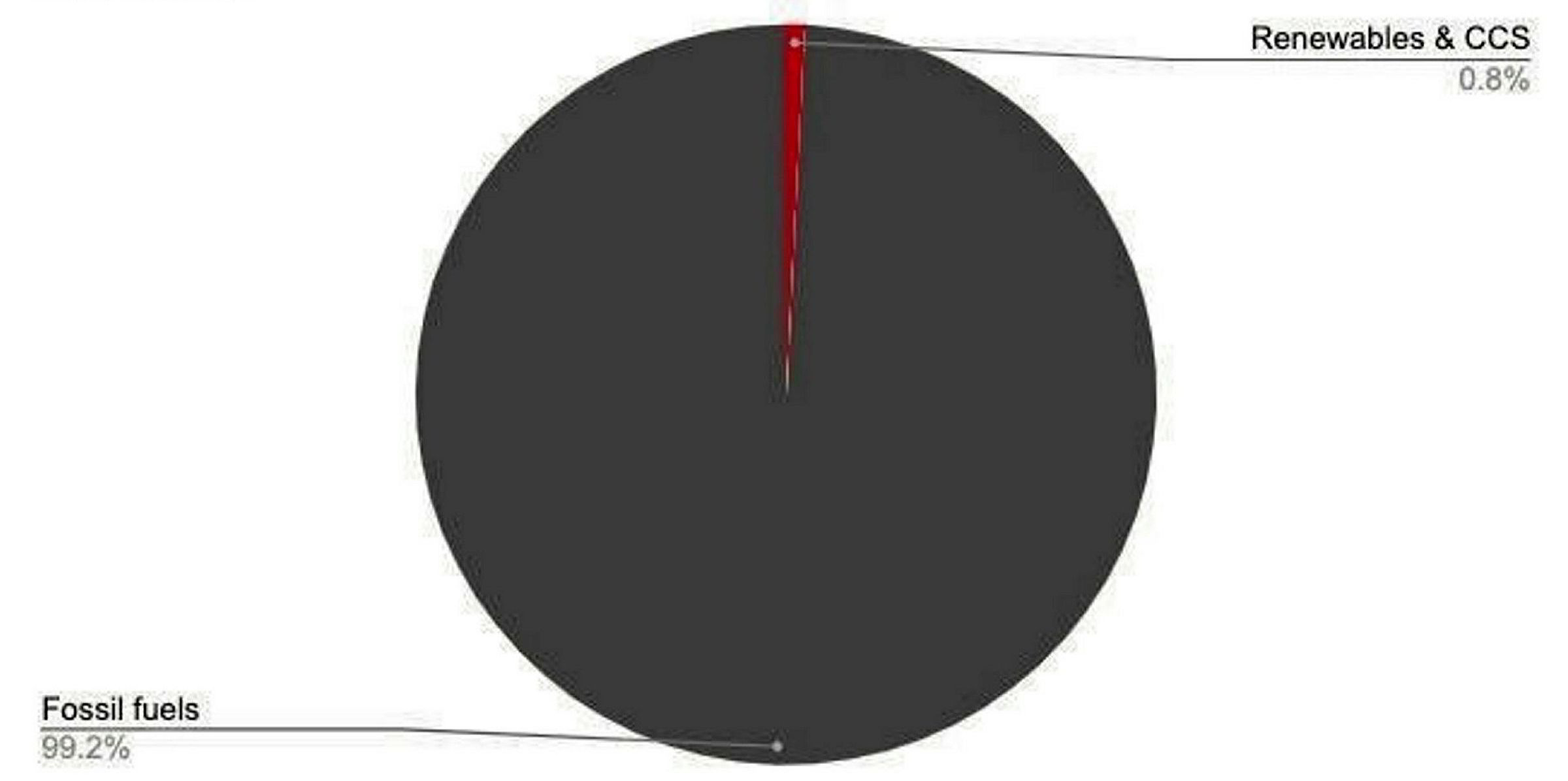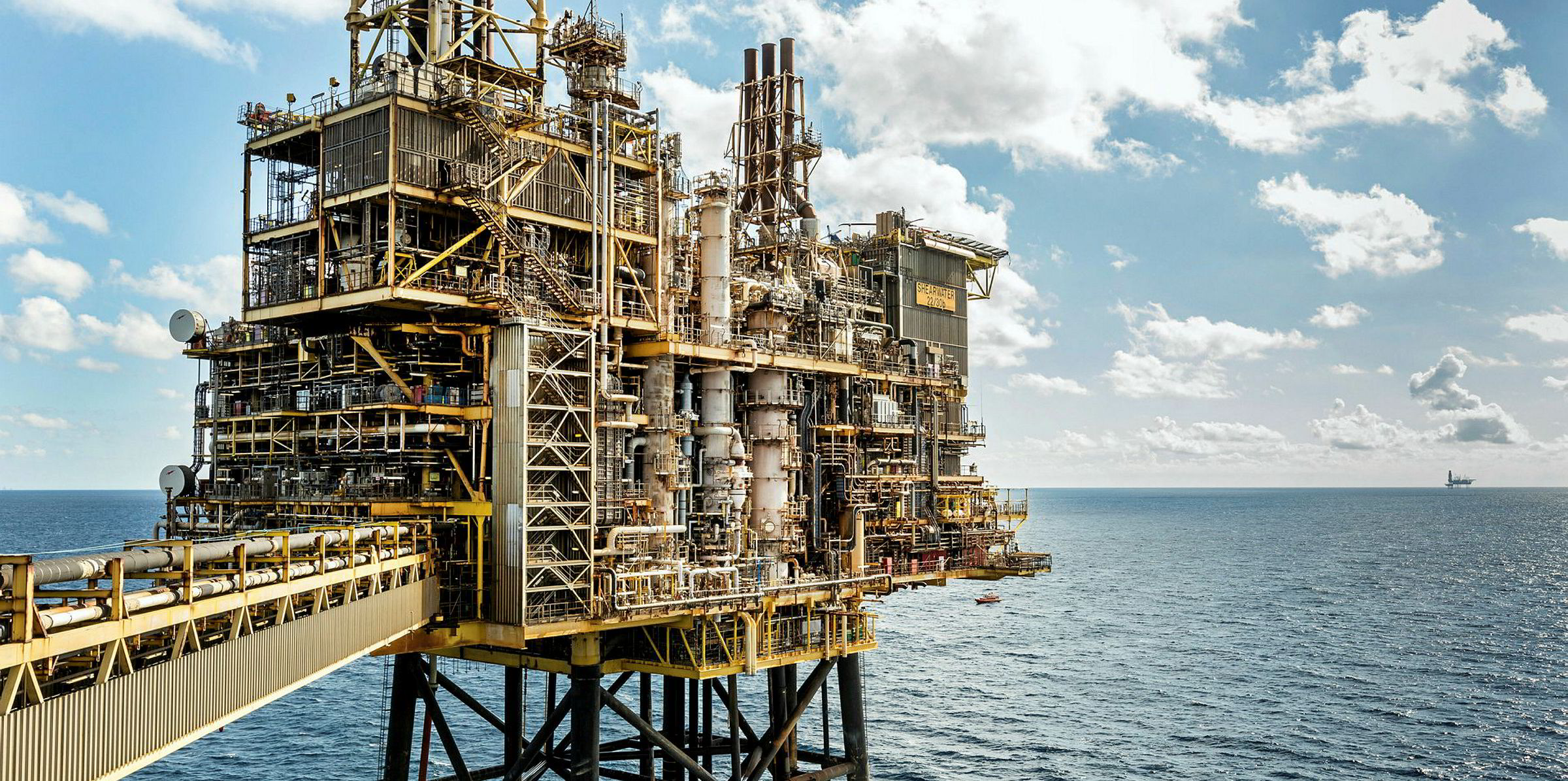Time for Big Oil to put its money where its mouth is over energy transition

IEA pie-chart showing oil & gas industry capital investment in 2019
Photo: IEA
With a share of total investment in renewables that's still woefully low, the fossil fuel sector needs to lead the world's clean energy shift from the front, writes Darius Snieckus
There could hardly have been a starker illustration of how far the oil industry has to go to start meaningfully contributing to combatting the unfolding global climate crisis: among the myriad bar and pie-charts in the Oil & Gas Industry in Energy Transitions report published last week by the International Energy Agency, a funereal black circle broken by the slimmest sliver of red, depicting the percentage of the sector’s capital investment in 2019 that was funneled into fossil fuels (99.2%), versus renewables and carbon capture and storage (0.8%).
IEA executive director Fatih Birol was politic when launching the study at the World Economic Forum in Davos, Switzerland, saying international oil companies (IOCs) had a “crucial role” to play in accelerating the shift to the renewables-based worldwide energy system needed to slow global heating – both by rapidly cutting emissions levels from their operations and ratcheting up investment in a range of key clean-energy technologies.

'Renewables growth must increase fourfold by 2030 to meet climate targets'
With a share of total investment in renewables that's still woefully low, the fossil fuel sector needs to lead the world's clean energy shift from the front, writes Darius Snieckus
There could hardly have been a starker illustration of how far the oil industry has to go to start meaningfully contributing to combatting the unfolding global climate crisis: among the myriad bar and pie-charts in the Oil & Gas Industry in Energy Transitions report published last week by the International Energy Agency, a funereal black circle broken by the slimmest sliver of red, depicting the percentage of the sector’s capital investment in 2019 that was funneled into fossil fuels (99.2%), versus renewables and carbon capture and storage (0.8%).
IEA executive director Fatih Birol was politic when launching the study at the World Economic Forum in Davos, Switzerland, saying international oil companies (IOCs) had a “crucial role” to play in accelerating the shift to the renewables-based worldwide energy system needed to slow global heating – both by rapidly cutting emissions levels from their operations and ratcheting up investment in a range of key clean-energy technologies.

'Renewables growth must increase fourfold by 2030 to meet climate targets'
Read more
Birol, who has been overseeing the IEA’s own ongoing shape-shifting from an oil market watchdog – its raison d'être atits formation in response to the 1973 oil crisis – to a global all-energy advisory body, underscored that “no energy company [would] be unaffected” by the energy transition, a transformation to which “every part of the industry needs to consider how to respond”, as failure to answer the growing public demand for greenhouse gas emissions reduction “could threaten their long-term social acceptability and profitability”.
“Doing nothing is simply not an option,” he said, though of course, the IOCs – and indeed national oil companies – have been doing as close to ‘nothing’ as possible despite knowing for decades of the coming environmental impact of exploration, production, transport, refining and consumption of fossil fuels.
Recent calculations from analyst group Rystad Energy shows that Europe’s five largest oil companies – Shell, BP, Total, Eni and Equinor – have to date together spent the grand sum of $5.5bn on renewables, compared to a combined total energy project budget of almost $90bn in 2019 alone. Widening that calculation to include American petro-giants ExxonMobil and Chevron adds only pennies to the clean-energy pot.

Oil supermajor BP backs offshore wind for lift-off Read more
IOC delaying tactics and pro-oil government lobbying efforts look to be finally running of steam, with HSBC in a recent research note calling management of the energy transition “the defining issue” for oil & gas majors in the coming years, one predicated on a “core dilemma: [how] to adapt quickly enough to thrive in the transition, without compromising returns or shareholder value”.
On one level, it is not a question of money: outgoing Shell New Energies chief Mark Gainsborough told a session at last year's BNEF Summit in London that his company will “have an even stronger role to play in a subsidy-free world” given the “bigger balance sheets” evolving energy companies like his could bring to bear on the energy transition.
Nor is the Anglo-Dutch oil giant alone. By HSBC’s calculus, IOCs are set to generate $600bn of investible capital over the next 30 years that could be “redeployed as significant energy landscape uncertainties loom”.
But to channel some pie-chart-changing percentage of this expenditure into clean-energy would require that another equation is reconfigured: an internal rate of return deemed acceptable to IOCs and their shareholders, who have grown accustomed to roughly 20% coming back from oil & gas assets and could only count on 5-9% from renewables projects, as their economics are now.

'Rise of the renewable majors': Goldman Sachs tips six winners of €7trn green bonanzaRead more
Of the wider international oil sector views on the transition coming down the pipeline, a new survey by consultancy DNV GL is revealing of the deeper contradictions in expectation. Some 44% of those polled by the consultancy for its New Directions, Complex Choices: The outlook for the oil and gas industry in 2020 report said they would be boosting their clean-energy spend, up from 34% last year, and 60% saw capital spending on large oil & gas projects foreseen being reined-in in 2020, up from 44% two years ago, as their organisations “actively adapted to a less carbon-intensive energy mix”.
Yet in the same breath, two thirds (66%) of the 1,000 senior oil & gas professionals contacted by DNV GL for its report were confident of oil industry’s growth this year, down a mere 10 percentage points on 2019.
And here’s the rub. Though the IEA made clear that low-carbon electricity would “undoubtedly move to centre-stage in the future energy mix”, it cautioned that investment in oil & gas production could not stop completely as this would result in a decline in supply of around 8% a year, which would be “larger than any plausible fall in global demand”, meaning expenditure on “existing fields and some new ones remains part of the picture”.

Offshore oil industry 'social licence to operate under threat' in UK
Birol, who has been overseeing the IEA’s own ongoing shape-shifting from an oil market watchdog – its raison d'être atits formation in response to the 1973 oil crisis – to a global all-energy advisory body, underscored that “no energy company [would] be unaffected” by the energy transition, a transformation to which “every part of the industry needs to consider how to respond”, as failure to answer the growing public demand for greenhouse gas emissions reduction “could threaten their long-term social acceptability and profitability”.
“Doing nothing is simply not an option,” he said, though of course, the IOCs – and indeed national oil companies – have been doing as close to ‘nothing’ as possible despite knowing for decades of the coming environmental impact of exploration, production, transport, refining and consumption of fossil fuels.
Recent calculations from analyst group Rystad Energy shows that Europe’s five largest oil companies – Shell, BP, Total, Eni and Equinor – have to date together spent the grand sum of $5.5bn on renewables, compared to a combined total energy project budget of almost $90bn in 2019 alone. Widening that calculation to include American petro-giants ExxonMobil and Chevron adds only pennies to the clean-energy pot.

Oil supermajor BP backs offshore wind for lift-off Read more
IOC delaying tactics and pro-oil government lobbying efforts look to be finally running of steam, with HSBC in a recent research note calling management of the energy transition “the defining issue” for oil & gas majors in the coming years, one predicated on a “core dilemma: [how] to adapt quickly enough to thrive in the transition, without compromising returns or shareholder value”.
On one level, it is not a question of money: outgoing Shell New Energies chief Mark Gainsborough told a session at last year's BNEF Summit in London that his company will “have an even stronger role to play in a subsidy-free world” given the “bigger balance sheets” evolving energy companies like his could bring to bear on the energy transition.
Nor is the Anglo-Dutch oil giant alone. By HSBC’s calculus, IOCs are set to generate $600bn of investible capital over the next 30 years that could be “redeployed as significant energy landscape uncertainties loom”.
But to channel some pie-chart-changing percentage of this expenditure into clean-energy would require that another equation is reconfigured: an internal rate of return deemed acceptable to IOCs and their shareholders, who have grown accustomed to roughly 20% coming back from oil & gas assets and could only count on 5-9% from renewables projects, as their economics are now.

'Rise of the renewable majors': Goldman Sachs tips six winners of €7trn green bonanzaRead more
Of the wider international oil sector views on the transition coming down the pipeline, a new survey by consultancy DNV GL is revealing of the deeper contradictions in expectation. Some 44% of those polled by the consultancy for its New Directions, Complex Choices: The outlook for the oil and gas industry in 2020 report said they would be boosting their clean-energy spend, up from 34% last year, and 60% saw capital spending on large oil & gas projects foreseen being reined-in in 2020, up from 44% two years ago, as their organisations “actively adapted to a less carbon-intensive energy mix”.
Yet in the same breath, two thirds (66%) of the 1,000 senior oil & gas professionals contacted by DNV GL for its report were confident of oil industry’s growth this year, down a mere 10 percentage points on 2019.
And here’s the rub. Though the IEA made clear that low-carbon electricity would “undoubtedly move to centre-stage in the future energy mix”, it cautioned that investment in oil & gas production could not stop completely as this would result in a decline in supply of around 8% a year, which would be “larger than any plausible fall in global demand”, meaning expenditure on “existing fields and some new ones remains part of the picture”.

Offshore oil industry 'social licence to operate under threat' in UK
Read more
The DNV GL 2019 Energy Transition Outlook’s numbers make for even plainer reading on this: as it stands, oil and gas will be at the heart of the global energy system in the coming decades, accounting for 46% of the energy mix in 2050 compared with 54% today – a contribution that will result in emissions creating global heating that will far overshoot the 1.5°C target set out in the Paris Agreement.
As Ditlev Engel, CEO of DNV GL - Energy, said in a recent interview with Recharge: “Right now we are on a road to a place nobody wants to go.” Whether for profit or planet – or both – IOCs must now wait no longer to lead from the front in changing this. (Copyright)
The DNV GL 2019 Energy Transition Outlook’s numbers make for even plainer reading on this: as it stands, oil and gas will be at the heart of the global energy system in the coming decades, accounting for 46% of the energy mix in 2050 compared with 54% today – a contribution that will result in emissions creating global heating that will far overshoot the 1.5°C target set out in the Paris Agreement.
As Ditlev Engel, CEO of DNV GL - Energy, said in a recent interview with Recharge: “Right now we are on a road to a place nobody wants to go.” Whether for profit or planet – or both – IOCs must now wait no longer to lead from the front in changing this. (Copyright)
RELATED NEWS
EU presents €1trn plan to 'unleash green investment wave'
Transition
14 January 2020 11:17 GMT
Offshore wind industry-led action group formed to meet Paris targets
Wind
13 January 2020 8:52 GMT
New clean energy chief takes helm at oil giant Shell
Transition
10 January 2020 8:59 GMT
Floating fleet to put wind in offshore sails to reach 420GW by 2040: report
Wind
8 January 2020 17:12 GMT
US investment in sea-based wind 'to outgrow offshore oil & gas by 2025'
Wind
22 January 2020 9:06 GMT
27 January 2020 12:29 GMT UPDATED 27 January 2020 13:15 GMT
By Darius Snieckus
EU presents €1trn plan to 'unleash green investment wave'
Transition
14 January 2020 11:17 GMT
Offshore wind industry-led action group formed to meet Paris targets
Wind
13 January 2020 8:52 GMT
New clean energy chief takes helm at oil giant Shell
Transition
10 January 2020 8:59 GMT
Floating fleet to put wind in offshore sails to reach 420GW by 2040: report
Wind
8 January 2020 17:12 GMT
US investment in sea-based wind 'to outgrow offshore oil & gas by 2025'
Wind
22 January 2020 9:06 GMT
27 January 2020 12:29 GMT UPDATED 27 January 2020 13:15 GMT
By Darius Snieckus
No comments:
Post a Comment